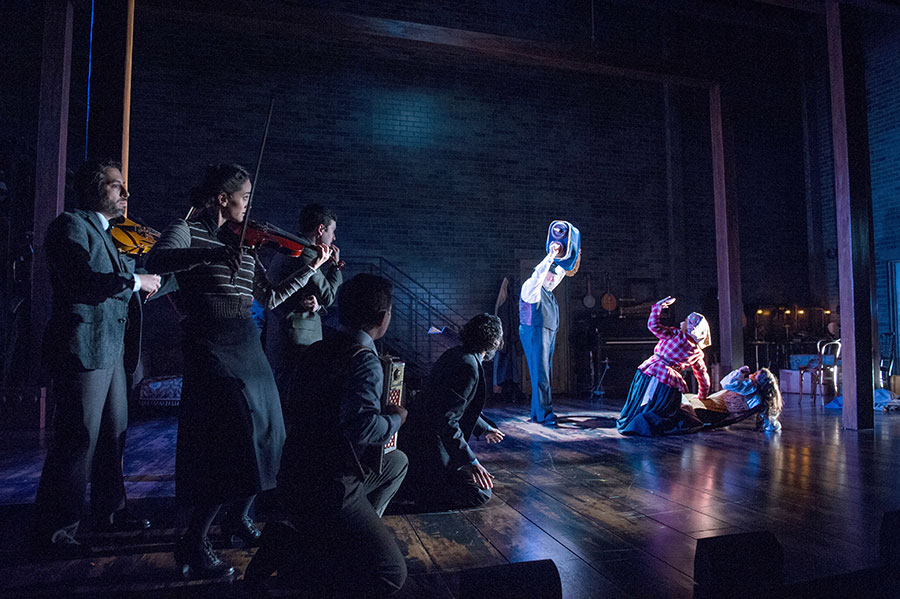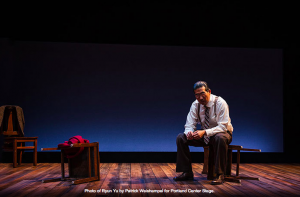Ghosts come alive at the start of Arena Stage’s production of Indecent, the dust rising from the actors’ heavy overcoats in poetic plumes. Lemml (Ben Cherry, bearded and earnest) serves as our narrator, introducing the audience to the ashen bodies that drift to center stage as he sets the scene. In those first few minutes, we meet the cast and encounter the pivotal moment upon which Paula Vogel’s entire play spins: a scene from Sholem Asch’s 1907 play God of Vengeance wherein two women dance and embrace in the rain. “Every night we tell this story but somehow I can never remember the end,” Lemml admits. “No matter, I can remember how it begins.” In a subtle, brilliant work of production design, he pushes a lopsided beam up to the rafters, literally opening up the world so we may enter, creating a space that enables the past and present to co-exist.
We see staged snippets of Vengeance—most frequently, variations of that aforementioned queer love scene and the final confrontation between a devastated father and daughter—but Vogel (a Pulitzer Prize winner for the 1997 play How I Learned to Drive), in telling the story of the controversy surrounding Vengeance, is more interested in the lives that orbit around Asch’s “little Jewish play” than the play itself. At the center is Asch, (played primarily by Max Wolkowitz and later, effortlessly, by Victor Raider-Wexler), a bright twenty-one-year-old eager to make his contribution to the Yiddish canon in spite of hostile dismissal from older gatekeepers. (Vengeance concerns a Jewish brothel owner whose young daughter Rifkele enters into an erotic spiritual relationship with Manke, an older prostitute.) “This is a play written by a Jew that hates Jews!” accuses one early reader, referencing its themes of lesbiansim, prostitution, and sacrilege. Such parochialisms, declared in the low-stakes safety of an elite writing salon, foreshadow the fuss that would plague the show’s Broadway production and eventually result in a charge of indecency against the entire cast and crew. For Asch and for his play, artistic transcendance came with a price.
A work as sincere and diligent as Indecent deserves actors who are equally so. Fortunately, the ten members of the ensemble sing, dance, and switch roles as nimbly as they shift from Yiddish to German to English and back again. Among the most earnest is Emily Shackelford who plays Asch’s wife Madje as well as both actresses who are cast as Rifkele in the play within the play. Nicknamed “The Ingenue” by Lemmel during his introductions, Shackelford is most at home in her role as the dewy American actress who embodies Rifkele for that doomed Broadway run. Funny and fresh from Smith College, Shackelford’s American provides surprising bits of comic relief opposite Susan Lynskey’s poised Halina (the German actress who plays Manke). The relationship between the characters Shackelford and Lynskey play are the pure nucleus of Indecent, and the actresses convey their bond with lyrical grace.
The many overlapping roles and leaps across histories and oceans necessitate clarification and repetition. Clever compressions of time (the phrase “a blink in time” is projected onto the walls to signify a jump forward) and unique stage directions (a subtle quarter turn of the body transforms a curtain call line into a queue at Ellis Island) help streamline the tight hour and forty-five minute runtime, but sometimes Vogel’s play seems weighted down by exposition. There were points, too, when a stilted delivery undermined the play’s expansiveness. And the musical numbers, though in some ways a welcome departure from the whispers of violent anti-semitism at home and abroad, felt wholly out of place. Despite these quibbles, Indecent remains gracious and timely, dealing delicately in themes of loss and life. “I am tired of living in a country that laughs when I speak,” cries Lemmel, his sentiment reverberating into the present. He longs, like all of us, to be heard before he returns to dust once more.






